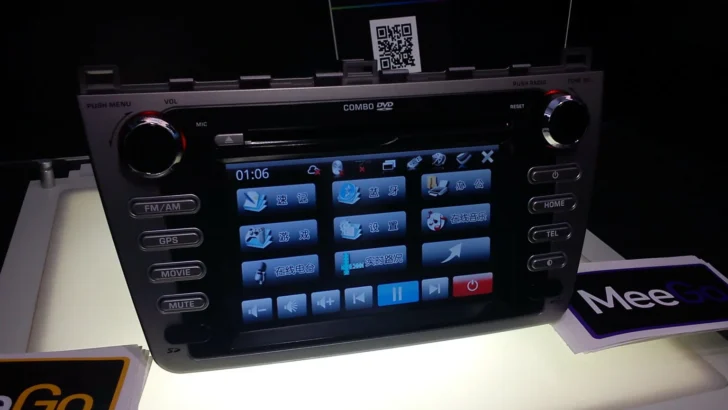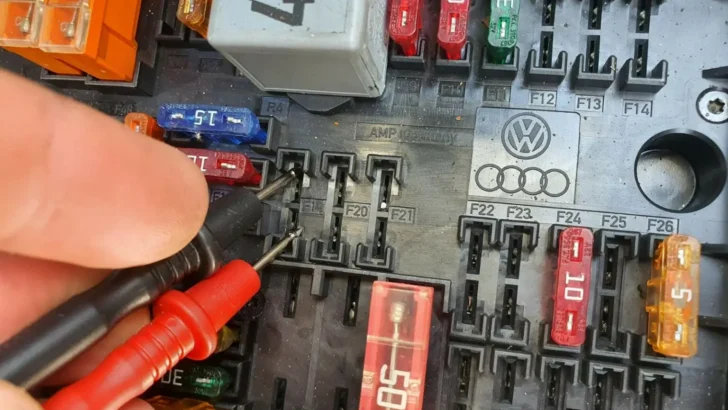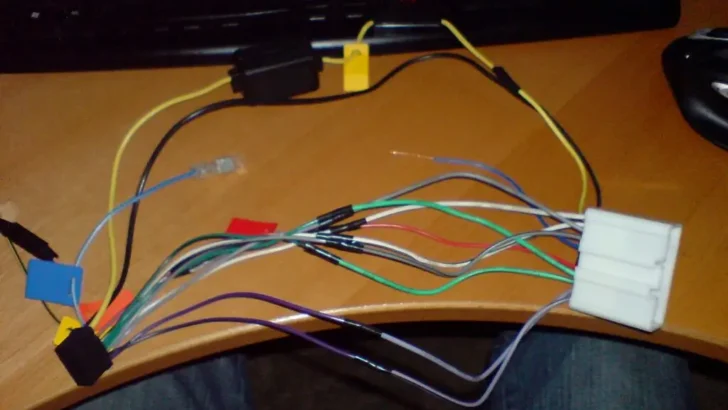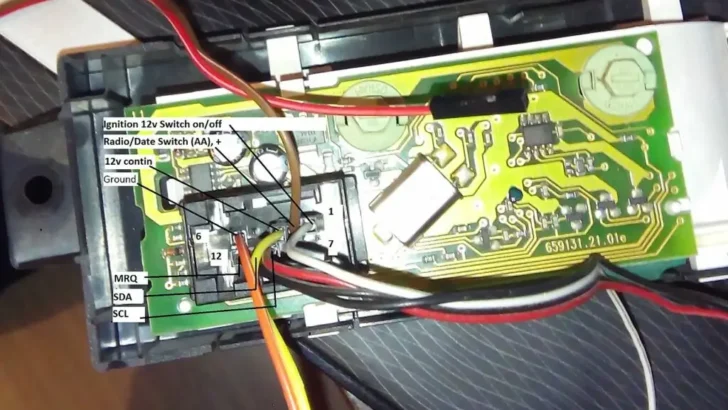Installing an aftermarket radio in your car can lead to a variety of electrical issues. But what exactly are those problems, and how can you fix them?
In this blog post, we’ll cover five of the most common electrical issues caused by aftermarket radios and offer tips on how to avoid them occurring in the first place.
An aftermarket radio can cause electrical issues in a vehicle, such as drawing too much power from the system, interfering with the ECU and even activating a check engine light, creating shorts if not properly grounded, and interfering with other electrical features like headlights, interior lights, chargers, etc.
- Key Takeaway
- 5 Common Electrical Problems Caused By Aftermarket Radio
- 1. Drawing too much power from the car’s electrical system
- 2. Interfering with the vehicle’s ECU, causing a check engine light
- 3. May cause electrical problems due to not being properly grounded
- 4. Electrical problems due to not being compatible with the car’s electrical system
- 5. Low-quality aftermarket radios
- How To Prevent Electrical Problems When Installing an Aftermarket Radio
- Can Installing a Radio Mess Up Your Car?
- What Happens If You Don’t Ground a Car Stereo?
- How Many Watts Does an Aftermarket Radio Put Out?
- FAQs
- Q: How does an aftermarket radio cause these electrical problems?
- Q: Can installing an aftermarket radio void my car’s warranty?
- Q: Is it necessary to use an additional wiring harness when installing an aftermarket radio?
- Q: Can a poorly installed aftermarket radio cause damage to other electronic components in the car?
- Q: What should I do if I experience electrical problems after installing an aftermarket radio?
- Q: Can using a power amplifier with an aftermarket radio cause electrical problems?
- Q: Will upgrading the car’s alternator help prevent electrical problems caused by an aftermarket radio?
- Q: Can I install an aftermarket radio myself, or should I seek professional installation?
- Conclusion and final thoughts
Key Takeaway
- Aftermarket radios can cause several electrical problems in vehicles, including drawing excessive power from the system, interfering with the Engine Control Unit (ECU), causing fuses to blow due to overloading, leading to battery drainage, and resulting in poor reception or connectivity issues.
- If you don’t ground a car stereo, it can lead to several problems such as static noise in your speakers, interference from nearby radio stations, irregular functioning of the amplifier, and potential damage to the stereo system.
- To prevent electrical problems when installing an aftermarket radio, it’s crucial to use the correct installation kit, ensure proper wiring and grounding, manage the power draw so it doesn’t overload the car’s electrical system, and consider professional installation to handle unexpected issues.
5 Common Electrical Problems Caused By Aftermarket Radio

Have you recently installed an aftermarket radio in your car and noticed some electrical issues? Here are 5 common electrical problems associated with installing an aftermarket radio:
1. Drawing too much power from the car’s electrical system

Aftermarket radios are a popular upgrade for many car owners. Unfortunately, these radios can sometimes cause electrical problems.
One common issue is that aftermarket radios draw too much power from the car’s electrical system. This may result in dimmed headlights, flickering dash lights, or even engine stalling.
In some cases, installing an aftermarket radio may even damage your car’s battery or alternator. If you’re having electrical issues after installing one, the initial step should be checking all wiring connections to make sure there are no exposed wires.
Also, ensure to use the correct size fuse for the radio. If still no luck, professional installation by a qualified technician may be necessary.
There are a few possible explanations why an aftermarket radio may draw too much power.
First, the unit could be wired incorrectly; for instance, if the + and – terminals are reversed, for instance, then it will draw twice as much as expected.
Second, older radios often use less efficient designs that weren’t intended to work with modern cars; finally, higher quality units require more energy consumption than factory-installed units do.
2. Interfering with the vehicle’s ECU, causing a check engine light

Check engine lights can be one of the most frustrating experiences for car owners. Not only do they indicate something is amiss with your vehicle, but they’re also difficult to diagnose.
In many cases, the cause of the check engine light is an easy fix; however, there may also be more complex issues at play.
Many car enthusiasts enjoy customizing their vehicles with aftermarket radios, but sometimes these modifications can lead to electrical issues.
One common issue that could occur when installing an aftermarket radio in your car is interference with the ECU of the vehicle – this may be caused by loose connections or faulty ground wires.
In certain vehicles, an aftermarket radio can cause the check engine light to illuminate if not installed correctly.
This occurs because the radio may interfere with your vehicle’s wiring, leading to issues with your electrical system.
In some cases, an aftermarket radio may not be compatible with your vehicle’s electrical system. If this occurs, it’s essential that you get your vehicle inspected by a qualified mechanic to prevent further harm to its electrical components.
3. May cause electrical problems due to not being properly grounded

Grounding a car radio is just as essential as selecting the correct speakers. Without an effective ground, electrical noise can interfere with the signal from the radio, leading to static and other issues. Furthermore, poor grounding may damage sensitive electronic components.
Improper grounding when installing an aftermarket radio can be a serious issue. Without proper grounding, the radio may cause interference with other electronics in the vehicle and even lead to overheating of the unit itself.
Additionally, improper grounding can lead to static electricity build-up that could damage the radio’s circuitry. To avoid these issues, be sure to have the radio installed by an expert who knows how to properly ground it.
The most popular method to ground an aftermarket radio is by running a wire from the chassis of the car to the ground terminal on the back of the radio. This will create a secure connection between them and reduce interference.
Another alternative is using a grounding block, which attaches to the chassis and provides multiple connections for grounding wires.
This may be useful if other electronic components in the car require grounding too. No matter which method you opt for, make sure it remains secure and free from corrosion or rust.
4. Electrical problems due to not being compatible with the car’s electrical system

Aftermarket radios are a popular upgrade for car owners. Unfortunately, some of these radios may cause electrical issues. Many aftermarket models may not always work in sync with your vehicle’s electrical system, leading to flickering lights, strange noises, or even complete electrical failure.
Some problems can be remedied with the installation of a fuse or other simple modifications. Unfortunately, in other instances, the only solution may be to replace your radio with one compatible with your car’s electrical system.
To comprehend why some aftermarket radios are incompatible with your car’s electrical system, it is first necessary to comprehend how that system functions.
The car’s electrical system converts engine mechanical energy into electrical energy that powers all essential elements like lights and accessories in your ride.
However, not all aftermarket radios use the same type of electrical energy. Some utilize direct current (DC), while others rely on alternating current (AC).
Since most car radios are designed to run off DC power, installing an AC-powered radio could potentially wreak havoc with your vehicle’s electrical system.
Incompatible radios can drain your battery, overheat wiring, and even start fires. Thus, it is essential that the radio you select is compatible with the car’s electrical system before beginning installation.
5. Low-quality aftermarket radios

Cheaply manufactured or improperly installed aftermarket radios can lead to problems with the car’s electrical system.
Signs of these issues may include flickering lights, radio interference, and unexpected battery drain. In many cases, these problems are fixable by simply replacing the radio with a better-quality unit.
However, if the electrical system has been damaged, professional repairs or replacement may be required. It’s essential to be aware of potential issues caused by aftermarket radios before making any modifications to your car’s electrical system says Four Wheel Trends.
How To Prevent Electrical Problems When Installing an Aftermarket Radio
Preventing electrical problems when installing an aftermarket radio involves careful planning, use of the correct installation kit, proper wiring, good grounding, and ensuring the system doesn’t draw excessive power from the car’s electrical system.
Use of Correct Installation Kit
To prevent electrical problems, it’s crucial to use the correct installation kit designed for your specific car model.
These kits include all the necessary components, like the wiring harness and antenna adapter, that you’ll need for a successful installation. The right kit can help ensure a proper fit and function and minimize potential electrical issues.
Proper Wiring
Correctly wiring the aftermarket radio is essential to prevent potential electrical issues. It’s often tempting to rush this process, but incorrect wiring can lead to several problems, such as blowing fuses or draining the car’s battery.
Always follow the instructions provided with the aftermarket radio and the installation kit to make sure all connections are made correctly.
Good Grounding
Ensuring good grounding is another critical aspect when installing an aftermarket radio. A poorly grounded wire can cause several issues, such as interference or static noise in the speakers, or even damage the stereo system. Always ensure the ground wire is securely connected to a metal part of the car’s body.
Manage Power Draw
Aftermarket radios can potentially draw more power than the car’s electrical system was initially designed to handle. This excessive power draw can lead to blown fuses and other electrical issues. It’s advisable to check the power requirements of the aftermarket radio and ensure it won’t overload the vehicle’s electrical system.
Professional Installation
While installing an aftermarket radio might seem like a straightforward task, having it professionally installed can help prevent potential electrical problems.
Professional installers have the experience and knowledge to handle unexpected issues that might arise during the installation. As a mechanic, I’ve seen many cases where a professional installation prevented major electrical issues down the line.
Can Installing a Radio Mess Up Your Car?

Installing a radio in your car may seem like an easy enough task, but improper installation can lead to numerous issues. Drilling into the dashboard creates unsightly holes and makes reinstalling the original radio difficult if you ever decide to sell your car.
When installing a new radio, it is essential to make sure all wiring is connected correctly. Otherwise, this could lead to multiple issues such as short circuits and electrical fires. Furthermore, an improperly installed radio consumes too much power and strains the car’s electrical system.
Running new wires through the interior of a car can pose trip hazards and damage other components if not properly secured. Furthermore, unfastened wires could rattle against other parts of the car, creating annoying noise and vibration.
Before installing an aftermarket car radio in your dash, be sure to weigh the advantages and drawbacks. It may be better for you just to enjoy music from your phone instead.
What Happens If You Don’t Ground a Car Stereo?

Failing to ground a car stereo properly can lead to various issues such as static in your speakers, interference from nearby radio stations, irregular amplifier functioning, and even potential damage to the stereo system.
Static in Your Speakers
A poorly grounded car stereo can result in static noise through the speakers. This typically occurs when there is no ground connection at all or if the existing one is faulty. The static noise is usually a result of electrical interference from other components in the vehicle, which a proper grounding would typically neutralize.
Interference from Nearby Radio Stations
Without a proper ground, your car stereo may also pick up interference from nearby radio stations. This happens because the grounding cable acts as a barrier against radio frequency interference. When this grounding is compromised, these signals can interfere with your stereo reception, leading to poor sound quality.
Irregular Amplifier Functioning
A bad ground connection can cause your amplifier to cut in and out or restart unexpectedly. This is because the ground wire is essential for the proper functioning of the amplifier, providing a path for the electric current to return to the power source. Without it, the amplifier might not function correctly, leading to inconsistent audio output.
Potential Damage to the Stereo System
Lastly, a lack of proper grounding can potentially cause damage to your car stereo system. A car stereo requires a ground connection to function. If this connection is not made or is faulty, it could lead to issues that cause long-term damage to the stereo system.
For instance, in my personal experience as a mechanic, I’ve seen cases where a poorly grounded stereo resulted in overheated wires, which can pose a significant risk to the entire vehicle’s electrical system.
How Many Watts Does an Aftermarket Radio Put Out?
Most aftermarket radios output between 14 and 18 watts RMS, with some higher-end models offering up to 22 watts RMS.
On the contrary, car radios typically only output between 4 and 6 watts RMS, so if you need more power from your radio, an aftermarket model is likely your best bet.
Be mindful that more power does not guarantee better sound quality. Unfortunately, many car stereos with high wattage ratings often sound harsh and distorted.
Therefore, make sure you do your research to ensure you purchase a top-tier stereo before making your purchase.
Aftermarket radios offer more features and superior sound quality than factory-installed radios, giving your car a personal touch.
However, before installing an aftermarket radio in your car, make sure its electrical system can handle the additional load.
Most aftermarket radios require more power than their factory counterparts, and if your car’s battery is already struggling to keep up, adding an aftermarket radio could be too much for it to handle.
If you’re uncertain whether your car’s electrical system can support an aftermarket radio, consult with a professional who can assess your car’s needs and help select one that won’t overload it.
FAQs
Q: How does an aftermarket radio cause these electrical problems?
A: Aftermarket radios often require additional wiring and modifications to the car’s electrical system, and improper installation can result in short circuits, overloading of circuits, or incorrect grounding, leading to various electrical problems.
Q: Can installing an aftermarket radio void my car’s warranty?
A: It depends on the terms of your car’s warranty. Some car manufacturers may not void the entire warranty, but they may not cover any damages caused by aftermarket modifications, including radio installations.
Q: Is it necessary to use an additional wiring harness when installing an aftermarket radio?
A: Using an additional wiring harness is highly recommended when installing an aftermarket radio. The wiring harness allows for easier connection between the new radio and the car’s existing wiring, reducing the risk of damaging the car’s electrical system.
Q: Can a poorly installed aftermarket radio cause damage to other electronic components in the car?
A: Yes, a poorly installed aftermarket radio can potentially cause damage to other electronic components in the car. Electrical surges, voltage spikes, or incorrect wiring can affect the car’s electronic systems such as the ECU (Engine Control Unit), ABS (Anti-lock Braking System), or airbag system.
Q: What should I do if I experience electrical problems after installing an aftermarket radio?
A: If you experience electrical problems after installing an aftermarket radio, it is recommended to check the wiring connections, grounding, and fuse ratings. If you are unsure about the installation or unable to resolve the issues, seek assistance from a professional car audio installer or a qualified technician.
Q: Can using a power amplifier with an aftermarket radio cause electrical problems?
A: Yes, using a power amplifier with an aftermarket radio can potentially cause electrical problems if not properly installed. Power amplifiers draw more current, so it is important to ensure that the car’s electrical system can handle the increased power demand.
Q: Will upgrading the car’s alternator help prevent electrical problems caused by an aftermarket radio?
A: Upgrading the car’s alternator to a higher output may help prevent some electrical problems caused by an aftermarket radio. A higher-output alternator can provide more power to meet the increased demands of the radio and other aftermarket electronic accessories.
Q: Can I install an aftermarket radio myself, or should I seek professional installation?
A: It is possible to install an aftermarket radio yourself if you have the necessary knowledge, tools, and experience. However, if you are unsure or inexperienced, it is highly recommended to seek professional installation services to ensure a proper and safe installation to avoid potential electrical problems.
Conclusion and final thoughts
In conclusion, it is important to be aware of the potential electrical problems that can arise from installing an aftermarket radio in your vehicle.
While these radios may offer added features and functionality, they can also cause issues with your car’s electrical system if not installed properly.
